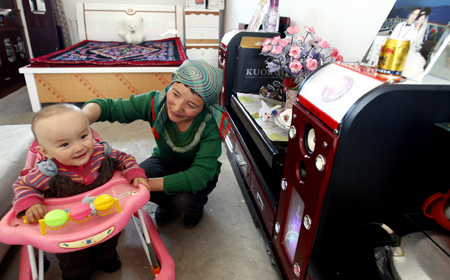Herders hope for greener pastures with new schedule
Updated: 2012-07-12 13:25
By Cui Jia (China Daily)
|
|||||||||||
Grassland responsibility
Xinjiang has 57.3 million hectares of grassland, 40 percent of which is severely degraded, according to Zhao Xinchun, chief livestock engineer at Xinjiang's department of animal husbandry.
The herdsmen have to realize that they have a responsibility to protect the grassland, according to Lu Yang, secretary of the Yiwu animal husbandry and veterinary bureau. Qianshan was home to around 40,000 sheep in 1995, but now there are 100,000 and the herdsmen keep raising more as the market price continues to rise, he added. "We have to keep the number of livestock and usable grassland in balance otherwise the result will be unimaginable," said Lu.
The depletion of the land greatly concerns Ajey, who likes to be called "Cowboy". "In the 1980s, you wouldn't be able to see a herdsman on a horse, because the grass would grow high enough to completely cover both of them. But now I would be jumping for joy if the grass grew as high as my ankles."
He feels uncomfortable with all the restrictions, even though he has received compensation, but is a realist: "I know something has to be done. Otherwise, the grassland that my ancestors revered might turn into desert one day."
That view is echoed by the authorities. "Corporations are required to invest in environmental protection programs if their activities damage the environment. It's called social responsibility and should apply to the herdsmen as well," said Lu.
However, the program has divided the men. It was welcomed by those who own a small number of livestock, because the subsidy ensures that their incomes will rise. But for owners of large flocks it's bad news, and the bureau has received plenty of complaints, he added.
Water security
In Xinjiang, each herdsman received an average subsidy of 1,380 yuan in 2011, almost half their average annual income the previous year, according to Zhao. Since the start of the year, the program has guaranteed an annual national subsidy of 90 yuan per hectare of prohibited grassland, but the policy was adjusted in Xinjiang to help fund a water conservation project in the area.
The subsidy for normal prohibited grassland in Xinjiang is now 82.5 yuan per hectare. That will free up around 75 million yuan as a special subsidy to safeguard water supplies on 100,000 hectares of prohibited grassland, said Zhao.
"We have to make sure the water conservation area isn't damaged, because water security is crucial to the future of both the grassland and people who live on it, so we've increased the special subsidy to 750 yuan per hectare," he explained. "The subsidy is like giving the grassland a paid holiday."
The Xinjiang authorities have stipulated that the grassland protection subsidy each herdsman receives should not be more than double the local annual income. In Qianshan township, a herdsman can receive a maximum of 3,200 yuan and a minimum of 1,800 yuan, no matter how many hectares of grassland he owns.
"The policy is designed to ensure that the distribution of the subsidy is fair, because the national subsidy program doesn't take the quality of the grassland into consideration," said Zhao. "Some herdsmen might own more than 660 hectares of depleted grassland, which means they couldn't even keep 100 sheep on it, but would be eligible to receive a subsidy of more than 54,450 yuan. On the other hand, some herdsmen might only own 33 hectares of rich grassland, meaning they could raise 100 sheep, but would only receive 2,700 yuan in subsidies. That would cause huge inequality among the herdsmen," he explained.
|
 |
|
Baharguli Jumarham moved with her husband to a settlement for herdsmen in Qianshan township in November 2011. The settlement, which is equipped with electricity and running water, has been their home since then. [Photo/China Daily] |
|
 |
|
A mobile movie team visits the herdsmen's settlement in Yiwu county twice a month to screen movies.[Photo/China Daily] |
Related Stories
Happy new life for herders 2012-07-11 20:22
The future looks solar bright for herders' kids 2011-09-13 13:41
Herders face five year ban on grazing 2011-08-01 10:45
Tibetan farmers, herders improve living standard 2011-02-25 16:36
Herders leaving grasslands in search of greener pastures 2010-08-03 07:50
863 herders stranded in snow in Qinghai 2008-11-12 07:14
Today's Top News
President Xi confident in recovery from quake
H7N9 update: 104 cases, 21 deaths
Telecom workers restore links
Coal mine blast kills 18 in Jilin
Intl scholarship puts China on the map
More bird flu patients discharged
Gold loses sheen, but still a safe bet
US 'turns blind eye to human rights'
Hot Topics
Lunar probe , China growth forecasts, Emission rules get tougher, China seen through 'colored lens', International board,
Editor's Picks

|

|

|

|

|

|





